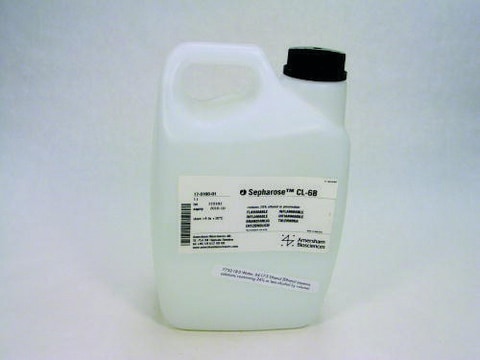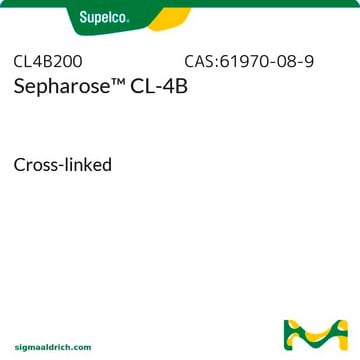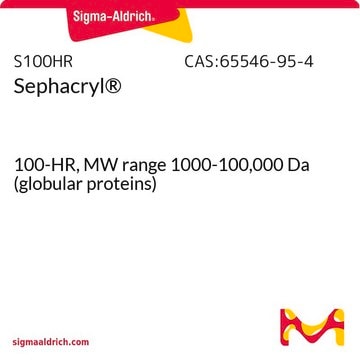CL6B200
Sepharose™ CL-6B Size Exclusion Resin
Cross-linked, 90-350 mesh
Sign Into View Organizational & Contract Pricing
All Photos(1)
About This Item
Recommended Products
product name
Sepharose™ CL-6B, Cross-linked
form
suspension
bead diameter
40-165 μm
pore size
10,000-1,000,000 fractionation range (Dextrans)
10,000-4,000,000 fractionation range (Globular proteins)
storage temp.
2-8°C
General description
Sepharose CL is a cross-linked derivative of sepharose, prepared by reacting sepharose with 2,3-dibromopropanol under strongly alkaline conditions.
Application
Sepharose CL-6B is used in affinity chromatography, protein chromatography, gel filtration chromatography, separation media and resins. Sepharose™ CL-6B has been used to study in vitro inhibition of human melanoma cells and to gather data in other valuable anticancer studies.
Sepharose™CL-6B has been used for the purification of glucoamylase enzyme and targeted ribonucleoprotein (RNP).
Legal Information
Sepharose is a trademark of Cytiva
replaced by
Product No.
Description
Pricing
Signal Word
Danger
Hazard Statements
Precautionary Statements
Hazard Classifications
Flam. Liq. 2
Storage Class Code
3 - Flammable liquids
WGK
WGK 3
Certificates of Analysis (COA)
Search for Certificates of Analysis (COA) by entering the products Lot/Batch Number. Lot and Batch Numbers can be found on a product’s label following the words ‘Lot’ or ‘Batch’.
Already Own This Product?
Find documentation for the products that you have recently purchased in the Document Library.
Customers Also Viewed
Rajendra K Sharma
Methods in molecular biology (Clifton, N.J.), 312, 325-342 (2005-01-01)
In general, the action of intracellular second messengers, 3':5'-cyclic adenosine monophosphate (cAMP) and 3':5'-cyclic guanosine monophosphate (cGMP), are terminated by cyclic nucleotide phosphodiesterase (PDE). In most mammalian tissues, PDE exists in multiple forms that differ in subcellular localization, catalytic, regulatory
Targeted Purification of RNA-Specific RNPs from Cell Lysates Through Immunoaffinity Precipitation to Identify Regulatory Proteins and RNAs
Beach DL and Keene JD
Methods in Molecular Biology, 69-69 (2008)
Yihong Chen et al.
Se pu = Chinese journal of chromatography, 25(3), 332-336 (2007-08-08)
The S-type lectins in annelida are different in molecular structure and biochemical properties from that of common galectin and are valuable in anticancer study. Based on their specificity, Sepharose CL-6B affinity chromatography was adopted in this study to separate the
J Friedland et al.
The Journal of clinical investigation, 67(4), 1151-1160 (1981-04-01)
To enable its immunohistologic localization, angiotensin converting enzyme (EC 3.4.15.1) from human lung was solubilized by trypsinization and purified approximately 2,660-fold to apparent homogeneity from a washed lung particulate fraction. The specific activity of pure enzyme was estimated to be
Eric Bertoft et al.
International journal of biological macromolecules, 49(4), 441-453 (2011-06-28)
The unit chains of amylopectin are organized into clusters. In this study, the cluster structure was analysed in detail in four different genotypes of barley, of which two possessed the amo1 genetic background. Amylose content of the barley starches differed
Our team of scientists has experience in all areas of research including Life Science, Material Science, Chemical Synthesis, Chromatography, Analytical and many others.
Contact Technical Service










